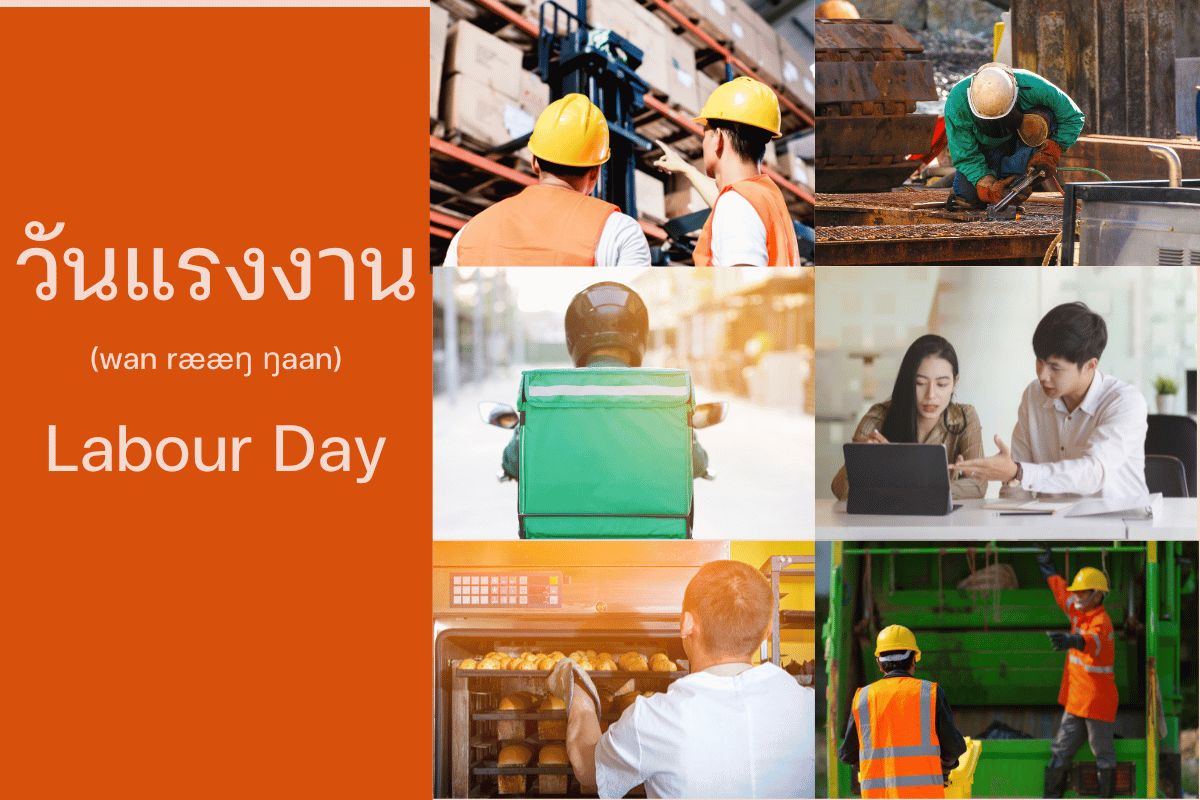May 1st is celebrated as วันแรงงาน (wan rææŋ-ŋaan) or Labour Day in Thailand and many other countries every year. The full name of the day is วันแรงงานแห่งชาติ (wan rææŋ-ŋaan hæ̀ŋ châat).
Let’s practice your Thai by learning more about this holiday.
In Thailand, วันแรงงาน (wan rææŋ-ŋaan) is considered a holiday for บริษัทภาคเอกชน (bɔɔrisàt phâak ʔèek-ka-chon) companies in the private sector and ธนาคาร (thanaa-khaan) banks.
However, หน่วยงานราชการ (nùay ŋaan râat-cha-kaan) government agencies are open as usual. Therefore, it is the day when the highest number of people use services at the government offices.
History of Labour Day in Thailand
Labour Day in Thailand was first mentioned in 1932 (B.E. 2475), when Field Marshal Plaek Phibunsongkhram was Prime Minister and King Rama VIII was on the throne.
In 1956 (B.E. 2499), the Thai government officially recognized May 1st as วันกรรมกรแห่งชาติ (wan kammakɔɔn hæ̀ŋ châat) or National Workers’ Day.
Later, in 1957 (B.E. 2500), the name was changed to วันแรงงานแห่งชาติ (wan rææŋ-ŋaan hæ̀ŋ châat) or National Labour Day.
During the early years, Thailand’s industrial sector began to expand significantly, and workers started to face increasing problems. Labour issues became more complex and difficult to resolve.
As a result, in 1932 (B.E. 2475), Thailand began organizing its labour administration system, which included workforce planning and development, as well as the protection and care of workers’ working conditions.
The goal was to create a foundation and improve relationships between employers and employees.
On April 20, 1956 (B.E. 2499), the Labour Commemoration Committee held a meeting and unanimously agreed to designate May 1st as a day to honor Thai workers. They submitted a formal request to the Prime Minister for the recognition of May 1st as this special day.
Labour Rights in Thailand
สิทธิแรงงาน (sìtthí rææŋ-ŋaan) or labour rights for แรงงานไทย (rææŋ-ŋaan Thai) Thai workers.
เวลาทำงาน (weelaa tham-ŋaan) working hours
8 hours a day and not more than 48 hours per week
เวลาพัก (weelaa phák) break time
นายจ้าง (naay-câaŋ) employers must provide ลูกจ้าง (lûuk-câaŋ) employees with at least one hour of rest during the first five hours of work.
Alternatively, with prior agreement, shorter rest periods of at least 20 minutes can be taken, but the total must remain at least one hour per day.
If a job requires uninterrupted performance or is an emergency, the employer may skip rest periods, but only with the employee’s consent.
วันหยุด (wan-yùt) holidays
วันหยุดประจำสัปดาห์ (wan-yùt pracam sàpdaa) weekly holiday
ลูกจ้าง (lûuk-câaŋ) employees are entitled to at least one day off per week, with no more than six consecutive working days in between.
They should receive ค่าจ้าง (khâa-câaŋ) wages on weekly holidays, except for daily or hourly workers. นายจ้าง (naay-câaŋ) employers and ลูกจ้าง (lûuk-câaŋ) employees can mutually agree to designate any day as the weekly day off.
วันหยุดตามประเพณี (wan-yùt taam prapheenii) traditional holidays
Employees must receive at least 13 traditional holidays per year, which include National Labour Day.
If a traditional holiday falls on a weekly holiday, วันหยุดชดเชย (wan-yùt chót-chəəy) a substitute holiday must be given on the next working day, and employees will receive wages for traditional holidays.
วันหยุดพักผ่อนประจำปี (wan-yùt phák-phɔ̀n pracam pii) annual leave
In short, people call it วันหยุดประจำปี (wan-yùt pracam pii).
Employees who have worked continuously for a full year are entitled to at least 6 working days of annual leave per year. Employees must receive payment for their annual leave days.
Both employer and employee may also agree in advance to accumulate and postpone annual leave to combine it with future years.
การทำงานล่วงเวลา (kaan-tham-ŋaan lûaŋ weelaa) Overtime Work
Thai people also say ทำโอที (tham O.T.) instead of ทำงานล่วงเวลา (tham-ŋaan lûaŋ weelaa) which means to work overtime. In situations such as continuous operation, potential damage from stopping work, or emergencies, the employer may require employees to work overtime or on holidays as needed.
ค่าล่วงเวลา (khâa lûaŋ weelaa) Overtime Pay
If an employee works overtime on a regular day, the employer must pay at least 1.5 times the hourly wage. For employees who are paid by ผลงาน (phǒn-ŋaan) output, they must receive 1.5 times the regular rate per unit produced.
If an employee works overtime on a holiday, the pay increases to three times the hourly wage or unit rate.
คำศัพท์ (kham-sàp) Vocabulary
| Thai | Definition |
|---|---|
| วันแรงงานแห่งชาติ (wan rææŋ-ŋaan hæ̀ŋ châat) วันแรงงาน (wan rææŋ-ŋaan) บริษัทภาคเอกชน (bɔɔrisàt phâak ʔèek-ka-chon) ธนาคาร (thanaa-khaan) หน่วยงานราชการ (nùay ŋaan râat-cha-kaan) สิทธิแรงงาน (sìtthí rææŋ-ŋaan) แรงงานไทย (rææŋ-ŋaan Thai) เวลาทำงาน (weelaa tham-ŋaan) เวลาพัก (weelaa phák) นายจ้าง (naay-câaŋ ลูกจ้าง (lûuk-câaŋ) ค่าจ้าง (khâa-câaŋ) วันหยุดตามประเพณี (wan-yùt taam prapheenii) วันหยุดชดเชย (wan-yùt chót-chəəy) วันหยุดพักผ่อนประจำปี (wan-yùt phák-phɔ̀n pracam pii) วันหยุดประจำปี (wan-yùt pracam pii) การทำงานล่วงเวลา (kaan-tham-ŋaan lûaŋ weelaa) ทำโอที (tham O.T.) การทำงานในวันหยุด (kaan-tham-ŋaan nay wan-yùt) ผลงาน (phǒn-ŋaan) | National Labour Day Labour Day Companies in the private sector Banks Government agencies Labour rights Thai workers Working hours Break time Employers Employees Wages Traditional holidays Substitute holiday Annual leave Annual leave (short) Overtime Work To work overtime Working on Holidays Output |

